Hospitals make £260,000 from vending machines packed with high-calorie snacks
Ker-ching! Hospitals make a whopping £260,000 from vending machines packed with high-calorie snacks – and that’s just in Leeds!
- Leeds Teaching Hospitals NHS Trust has 43 vending machines across five sites
- They made £60,000 from the machines in 2017 and £260,000 from 2013-2018
- Each device serves predominately soft drinks, chocolate, crisps and/or sweets
Cash-strapped NHS hospitals are making thousands of pounds by selling sugary drinks, crisps and chocolate in vending machines – despite a Government crackdown.
Leeds Teaching Hospitals NHS Trust earned a staggering £260,000 through vending machine sales between 2013 and 2018, an investigation found.
Each of the automated dispensers serve an array of sugary drinks, chocolate, crisps and sweets alongside healthier options such as fruit.
The revelation of the trust’s extra income comes amid an NHS crackdown on the ‘epidemic of flab’, led by the chief of the health service.
Simon Stevens, head of NHS England, last year announced he would cut funding for trusts if they failed to remove super-sized confectionary from premises.
And he threatened to stop hospitals selling sugar-laden fizzy drinks if sales weren’t dramatically slashed.
Collectively, the UK’s 232 NHS trusts would create nearly £14 million from vending machines, each year.

On site: Leeds Teaching Hospitals NHS Trust, which runs St James’ Hospital and Leeds General Infirmary (pictured), has 43 vending machines across five sites – making £60,000 annually
The Yorkshire trust, which operates 43 vending machines at five sites, stressed only a fifth of their drinks sold in the dispensers contain added sugar.
And it added that each confectionary item is limited to 250 calories per portion – the same amount found in a hamburger from McDonalds.
The trust’s extra income – £60,000 last year – was uncovered by a Freedom of Information Request by the Yorkshire Evening Post. But there are 232 NHS trusts, so the total figure for the health service is likely to be much higher.
Stewart Golton, a member of Leeds City Council’s health and wellbeing board, slammed the newspaper’s revelations.
-

Why is pancreatic cancer STILL so hard to treat? Few survive…
Doctors race to save boy, 6, from rare neurological disorder…
Messages advising smokers to ‘make this your last pack’ and…
Scientist, 26, loses 8 STONE by ditching his vegan diet for…
Share this article
He said: ‘Hospital trusts are already under fire for their car parking charges, but this is an even more controversial money-raising move.
‘The trust is signed up to the obesity prevention work commissioned through the Leeds Health & Wellbeing Board.
‘But the provision of high calorie snacks in vending machines throughout its buildings smacks of double standards.’
Mr Golton added: ‘The hospital has a responsibility to make sure people often already struggling with their weight are not left relying on a vending machine.

Food for thought: Hospitals, which increasingly treat obese patients with weight-related problems, are making millions from the sale of sugary snacks
WHAT IS THE NHS CRACKDOWN ON FLAB?
Simon Stevens, chief executive of NHS England, threatened last April to stop hospital sites selling fizzy drinks if sales weren’t slashed to just 10 per cent of all possible drink sales.
It was hoped the controversial move – which has since led to sales of sugary drinks in hospitals being halved – would improve the diets of both patients and staff.
The reduction in sales, revealed in June, is equivalent to 1.1million cans of fizzy drink, ten million teaspoons of sugar or 160million calories.
Bosses ordered hospital shops last October to take super-size chocolate bars and ‘grab bags’ of sugary snacks off their shelves.
WH Smith announced this April it sold 1.1 million less chocolate bars since last April after it axed promotions – and removed a further 275,000 family-sized ones.
Other retailers such as Costa, Compass Group and The Royal Voluntary Service have also all curbed calories across their stores on NHS premises.
And NHS England figures show 175,000 more pieces of fruit had been sold in hospital stores across the country since the crackdown on flab began.
MailOnline has contacted both Public Health England and Leeds Teaching Hospitals NHS Trust for comment.
The UK is currently battling an obesity epidemic, which has led to children being fatter than ever before.
Figures in 1993 showed just 15 per cent of adults were obese – compared to 26 per cent in 2016.
If this trend continues, half of the population could be obese by 2030, which would place even greater burden on the NHS.
In 2016/7, there were 617,000 admissions in NHS hospitals where obesity was a factor, an increase of 18 per cent on 2015/16.
Mr Stevens threatened last April to stop hospital sites selling fizzy drinks if sales weren’t slashed to just 10 per cent of all possible drink sales.
It was hoped the controversial move – which has since led to sales of sugary drinks in hospitals being halved – would improve the diets of both patients and staff.
The reduction in sales, revealed in June, is the equivalent to 1.1 million cans of fizzy drink, ten million teaspoons of sugar or 160 million calories.
Bosses ordered hospital shops last October to take super-size chocolate bars and ‘grab bags’ of sugary snacks off their shelves.
WH Smith announced this April it sold 1.1 million less chocolate bars since last April after it axed promotions – and removed a further 275,000 family-sized ones.
Other retailers such as Costa, Compass Group and The Royal Voluntary Service all have also curbed calories across their stores on NHS premises.
And NHS England figures show 175,000 more pieces of fruit had been sold in hospital stores across the country since the crackdown on flab began.
Almost 700,000 NHS employees out of 1.3 million are thought to be overweight or obese.
UK IS THE ‘FAT MAN’ OF EUROPE
The UK is officially the fat man of Western Europe.
Government figures reveal that, on average, men from across the home nations tip the scales at 13st 3lb (84kg).
Only Americans, who weigh roughly 14st (89kg) and Australians, around the 13st 5lbs (86kg) mark, are heavier.
The figures, compiled today by Forza Supplements, add to the body of evidence that highlights the worrying obesity epidemic in the UK.

Rotund: Government figures reveal that, on average, men from across the home nations tip the scales at 13st 3lb
Organisation for Economic Co-operation and Development figures already show the UK has the second worst obesity rates in Europe – behind just Hungary.
The new report, using official data from the health boards of 10 countries, confirms the problem – and found men in the UK to be heavier than those in the Netherlands, Germany, Ireland, Italy, France and Spain. Spanish men weigh the least at 11st 11lbs (74.8kg).
The figures also delved into the life expectancy of men across the countries and how tall they are, on average.
Data also showed a stark difference in life expectancy, with men in the US expected to die four years earlier than men in some countries.
American men can expect to reach 76.9 years old – which experts have repeatedly blamed on the burgeoning obesity epidemic.
In contrast, life expectancy is 80.9 in both Japan and Australia – despite the latter also having a problem with bulging waistlines.
Source: Read Full Article



